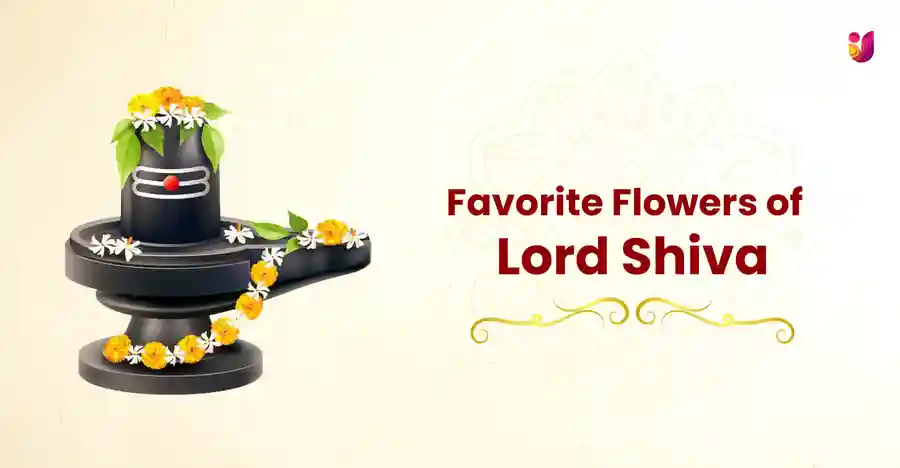Favourite Flowers of Lord Shiva: A Guide to Offering the Most Auspicious Blooms
Thu - Jan 30, 2025
4 min read
Share
Lord Shiv, also known as Hara, Mahadev, Mahakal, Maheśvara, Pashupati, Rudra, Shambhu, or Shankara. He is one of the supreme gods who creates, transforms, and protects the Universe and he is also known as the Destroyer. He is the God of Destruction, God of Time, lord of Yogis, and the Master of Poison and Medicine. Devotees offer many types of offerings to Lord Shiva and one of them is flowers. As Shiva is most connected with nature, worshipping him with his favorite flowers can be an essential part of prayer. According to the epic Mahabharata, when a devotee offers flowers to a deity with a pure heart, then the deity becomes gratified and blessed him or her with Prosperity. To invoke the blessings of Lord Shiva, it is essential to offer the right flower. In this blog, we will talk about the Favorite Flower of Lord Shiva.
Significance of offering flowers to Lord Shiva
Offering flowers to Lord Shiva is not just about placing blooms at his feet; it’s a symbol of devotion, and surrender, and a way to invoke his divine blessings. Each flower has its unique meaning, representing different aspects of life, such as purity, spiritual enlightenment, and detachment. By offering these sacred flowers, devotees express their love and seek Shiva’s grace to transcend the material world, leading to spiritual growth and liberation. Offer flowers to Lord Shiva have a very deep spiritual and symbolic significance. It is a method for invoking his sacred blessing. Offering Flowers to Mahadev is not just about placing the flowers at his feet but it is a symbol of devotion and surrender. Flowers represent purity and selfless devotion to the deity. These flowers reflect a devotee’s love, respect, and surrender to Lord Shiva. Each flower represents a different meaning and has its symbolism.

Favourite Flowers of Lord Shiva
Here is a list of different types of flowers offered to Lord Shiva:
1. Bilva leaves and Flowers
The most sacred offering to Lord Shiva. This flower is believed to cool down his fiery energy and cleanse the devotees' sins. We can not strictly say that this is a flower but it is offered along with its fragrant white flowers. Bilva leaves are considered very auspicious and their three leaves depict Lord Shiva’s three eyes. This represents his power to observe the past, present, and future. The leaves also symbolize the Trishul of Lord Shiva and it also represents purity, prosperity, and spiritual awakening.
2. Dature ( Devil's trumpet )
The Devil’s Trumpet flower is one of the most unique flowers offered to Lord Shiva. The flower is popular for its distinctive trumpet-like shape and intoxicating fragrance. This flower is a poisonous flowering plant in the nightshade family. According to the mythology, the flower emerged to calm his energy when Shiva consumed the Halala (poison) during the Samundra Manthan. The datura flowers represent transformation, detachment, and the power to overcome negativity.
3. Akanda (Crown Flower)
Akanda is considered a very special flower to offer Lord Shiva. It has beautiful white and purple petals which are believed to invoke the presence of Mahadev. It is a very special flower that thrives in tough situations, representing resilience and strength. This flower reflects the acceptance of Lord Shiva toward simplicity and his simple lifestyle. Offering Akanda flowers to Lord Shiva purifies the mind, body, and soul of the devotees.
4. Kaner (Oleander)
Kaner Flower, also known as Oleander Flower, is a vibrant flower with pink and yellow petals. This flower is used in the festival Shivratri and it represents joy, peace, and devotion. Offering this flower to Lord Shiva invokes inner happiness and brings peace into your life.
5. Jasmine (Mogra)
Jasmine has a very sweet fragrance that symbolizes purity, love, and peace. It is a very revered flower in the worship of Lord Shiva. Offering jasmine to Lord Shiva invokes calmness and serenity which helps devotees experience for getting peace.
6. Aparjita (Clitoria Ternatea)
This flower represents victory, devotion, and spiritual success. The Aparjita flower is considered very auspicious in the worship of Lord Shiva. The flower has blue and white petals which are linked with the divine strength of the deity. To get the blessing of overcoming challenges, this flower is offered to Mahadev.
7. Lotus
Lotus represents spiritual enlightenment, detachment, and purity. This flower grows in muddy water and it remains untouched by impurities, representing the ideal spiritual energies. The Lotus flower represents the devotee’s aspiration for liberation. This flower is a reminder to rise above impure distractions and pursue spiritual growth. This flower is also associated with Goddess Laxmi.
8. Parijat (Night-Flowering Jasmine)
The Parijat flower also known as Night-Flowering Jasmine, is a sacred and divine flower that is offered in the worship of Lord Shiva. It has a divine fragrance and beautiful appearance which makes it ideal for Mahadev. The flower is believed to be the gift of heaven and was brought to the Earth after the Samundra Manthan by the gods.
How to offer flowers to Lord Shiva
When offering flowers to Lord Shiva, the flowers should be fresh unbroken flowers without any blemishes.
When offering flowers to Lord Shiva, the flower should be placed face upwards to receive the blessings of Lord Shiva.
Tulsi flowers and Ketaki leaves are not advised to be offered as it is considered inauspicious for Lord Shiva.
Share